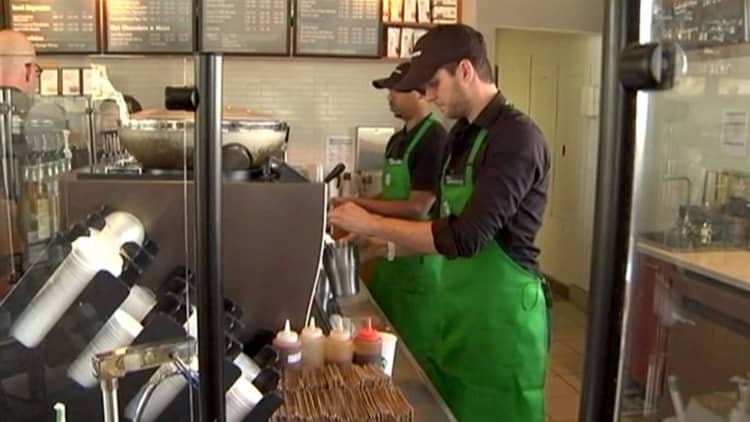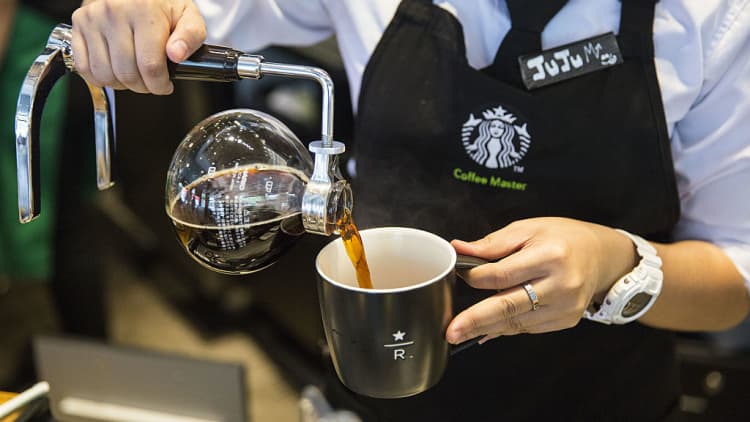
Starbucks said it expects its fast-growing China business could one day eclipse its U.S. market.
The company said Wednesday it plans to open 12,000 additional stores globally in the next five years, taking the chain to a total of about 37,000 outlets. Half of the new units will be in the U.S. and China.
"Our core business has never been stronger in the U.S. and around the world," Starbucks Chairman and CEO Howard Schultz told analysts at the coffee retailer's investor day event in New York.
The CEO also emphasized something he's said before: "These are the early days of the growth and development of the company. If Starbucks was a 20-chapter book, I still think we're in chapter 4 or 5."
"Demand is there, and our ability to deploy capital and get the return on invested capital is very strong," Starbucks President and COO Kevin Johnson told attendees. Johnson will become CEO of Starbucks in April, succeeding Schultz, who will continue as the Seattle-based company's chairman.
Executives during presentations Wednesday highlighted how the company is focusing on both its flagship Starbucks stores and the higher-end Reserve Roastery and Tasting Room outlets for future growth. The company also has targeted the Reserve Roastery stores, which will sell premium coffee at around $10 a cup, to represent about one-fifth of total outlets by 2021.
Also, Starbucks plans to open new stand-alone outlets under Princi, a high-end Italian bakery the company invested in over the summer. The bakery will serve pizza and have locations in major markets such as New York, Seattle and Chicago by 2018. Moreover, Princi food is expected to be offered at all of the company's new Roastery locations.
Starbucks presented a five-year strategic plan to grow earnings per share between 15 and 20 percent and targeted "mid-single digit" comparable-store sales growth. The company sees retail revenue growing during this period at an annual growth rate of 10 percent.
"I know some of you are concerned about the slowdown in U.S. comps, which candidly I don't share," Schultz told analysts.
Schultz said the retailer continues to open 500 to 600 stores annually and the new store performance on a sequential basis has been "better than the year before. There's no better evidence of the health, the strength, the equity of the brand and the relevance of the Starbucks business."
On the international front, Schultz said China is one market that remains particularly attractive for the retailer.
"Not only will China one day be bigger than the U.S., but our business in China will demonstrate that we will be one of the...most significant winners in terms of a Western consumer brand," he said.

Indeed, China remains the company's fastest growing market and management sees revenue and operating income nearly tripling there over the next five years. The chain is opening a new Starbucks store in China about every 15 hours and will soon reach 2,500 stores in 118 cities.
"Despite our early success, we are only in the beginning chapters of our growth story," Starbucks China CEO Belinda Wong told analysts Wednesday. "In the next five years, we're well positioned to double our scale to 5,000 stores in over 200 cities."
Wong said urbanization and an emerging middle class in China will help drive the rapid expansion of the specialty coffee market. Management also sees a "huge potential" in China with Teavana, the company's tea brand.
According to Wong, more than 230 million people in China have been lifted into the middle class in the past decade due to the Asian nation's booming economy, and over the next six years she said another roughly 300 million people will also attain middle-class status.
"Coffee consumption in China is currently low, but growing rapidly," Evercore ISI analyst Matt McGinley said in a research note this week. "On a per person basis, Chinese people consume less than 2 percent of the coffee of U.S. consumers and less than 3 percent of the coffee of Japanese people."
The company also said it sees food innovation and its cold coffee beverages as key areas fueling its future growth.


